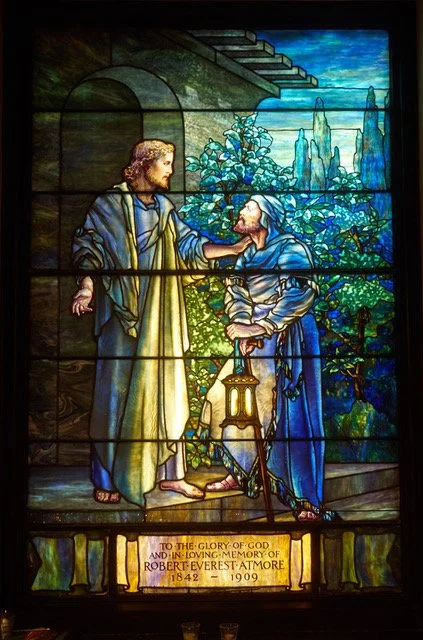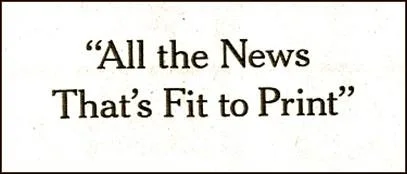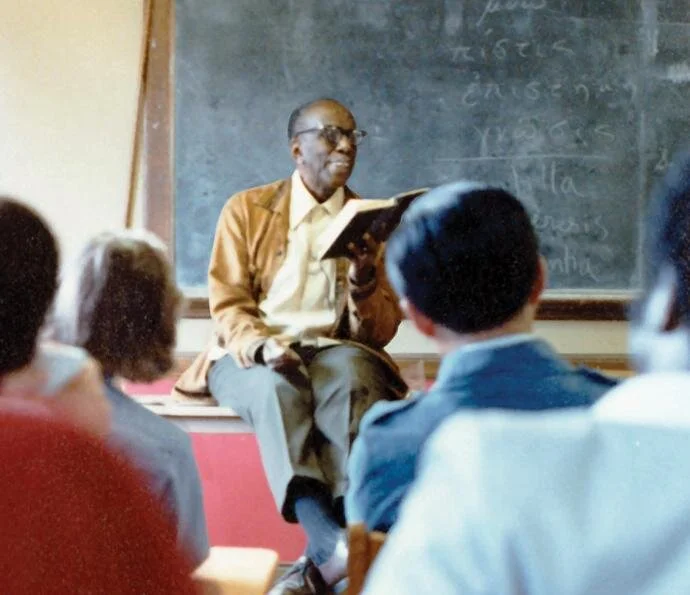On Anthony the Great, Father of all the Desert Fathers
He was like a physician given by God to Egypt. For who met him grieving and did not go away rejoicing? Who came full of anger and was turned to kindness?....What monk who had grown slack was not strengthened by coming to him? Who came troubled by doubts and failed to gain piece of mind”
— Athanasius, Bishop of Alexandria, The Life of Anthony (360, A.D.)
Desert Mothers Saint Paula and Eustochium with Saint Jerome, painting by Francisco de Zurbarán
I. On January 17, the church remembers Antony (251-356), “Abbot in Egypt” as the Episcopal lectionary of holy people, A Great Cloud of Witnesses identifies him. Antony is more widely known as Anthony the Great, “The Father of All Hermits,” whose biography was written by Athanasius, Bishop of Alexandria (279-373). This book, The Life of Anthony, written originally in Greek and then translated into Latin and one of the most popular texts in all of Christian literature through the end of the Middle Ages, helped make Anthony and the Desert Fathers and Desert Mothers who revered him, unusually important and widely influential.(Yes, there were Desert Mothers, which I’ll explain in a moment) And this is both remarkable and revealing, as at the same time that the Desert Fathers and Desert Mothers were flourishing, the emerging church was doing battle with itself over what turned out to be a major conflict with Arius and Arianism. In contrast, the Desert Fathers and Mothers battled their own selfs and this contrast points to why Anthony went to the desert in the first place.
II. But why write about Anthony the Great, you ask? What could we possibly learn from one of the 3rd and 4th Century Desert Fathers and Mothers, even from one as exemplary and influential as Anthony? This question is at the very heart of today’s Friday Reflection. Stay with me.
III. In the last several weeks, and last week in particular, we have come face to face with some of our darkest encounters, not the extreme darkness of COVID-19 and the deaths of now over 375,000 of us, but a darkness that came with a wild insurrection and attempted coup, the President of the United States inciting an attack on the Congress, and the realization that something akin to fascism has begun to poison our democracy. We could not have imagined, perhaps until now, what madness our country has gone through because of a president who has been “a misogynist con artist who sympathized with white supremacists who [has done] a whole lot of damage.” (Margaret Sullivan in the Washington Post, January 13, 2021.) The damage is real and perhaps long-lasting, and if we are honest with ourselves, we must wonder how we will go forward in such a way that we can give democracy a chance to survive. The power, on the one hand, of the pandemic to continue to beat us down and, on the other hand, the jaggedness and low-boiling rage exhibited by many of the players in the political and social media constellations, are enough to humble us, at least enough to ask, “What have we done”? But now, it is not that we have to face what we have done—that is difficult enough—but to face what we have left undone. As Harry Potter might ask, what have we done about the “Death Eaters”?
IV. Most merciful God, we confess that we have sinned against you in thought, word, and deed, by what we have done and by what we have left undone…(BCP, Holy Eucharist Rite II, “Confession of Sin”)
St. Anthony Abbot, by Francisco de Zurbarán, c. 1664
The tension in the traditional “Confession of Sin” is what led Anthony to the Egyptian desert when he was 20 years old. His parents had died and he inherited a great deal of money and valuable property and became responsible for the care of his sister. What was “left undone” for Anthony was taking charge of his life, and the path he chose was to flee from a society that kept him from finding himself and living in God (remember the battle over Arianism). Having heard God’s call to be perfect -(Matthew 19: 21)- Anthony gave some of his family property to his neighbors and sold the rest, and then gave all of his money to the poor; and he put his sister under the care of Christian holy women.
V. Anthony sought an ascetic and spiritual life, a life with many fewer distractions and temptations, a life in which he would not be ruled by others. For Anthony, this choice of what he viewed as a life free from worldly cares, was a life which would allow him to find his true self in God. This choice was not intended to be a rejection of the world as much as it was a call to find one’s true self under the authority of God and the lived experience of wisdom, love and fidelity. Anthony did not intend to be “extraordinary” or to be seen as extraordinary. Anthony and those Desert Fathers and Mothers who followed him, “came to the desert to be themselves, their ordinary selves, and to forget a world that divided them from themselves.” Thomas Merton takes us further into the “desert way” that Anthony’s life exemplified. “There can be no other valid reason for seeking solitude or for leaving the world. And thus to leave the world, is, in fact, to help save it in saving oneself.” (Thomas Merton, The Wisdom of the Desert, pp. 22-23)
VI. At first, Anthony found a way to live as a local hermit while under the watchful eye of a more experienced hermit. In progressive steps, he moved out to the desert, 50 miles or so from Alexandria. After many years, Anthony moved into one of the tombs near where he grew up. Eventually, he “retired” further into the desert and created his own enclosure (his sacred space) where he lived as a hermit in total solitude for 20 years. This is the period in which Anthony practiced severe austerity, fasting, as well as the mystical tradition of stillness, rest, quiet and interior silence with “unceasing prayer,” all in the context of solitude. Henri Nouwen has said that “unceasing prayer” really means to “think, speak, and live in the presence of God.” (Henri Nouwen, Spiritual Direction, p. 61). Anthony’s goal was to achieve through his prayer, a tranquility in God, and inner and outer silence. We might call it a sacred serenity.
VII. What Anthony helped form, shape, and mentor, were communities of hermits and anchorites (women hermits) in huge numbers, communities that relied on the wisdom of their elders, called Abbas (Fathers) and Ammas (Mothers). Among the hermits, Abba Anthony was perhaps the most highly regarded, and among the anchorites the highly regarded were Amma Sarah, Amma Theodora and Amma Syncletica. All these holy people are to be found in the Verba Seniorum, The Sayings of the Desert Fathers [and Mothers], which includes 1,202 sayings attributed to twenty-seven Abbas and three Ammas. What we learn from the Verba Seniorum in that “the basic realities of the interior life are… faith, humility, charity, meekness, discretion, self-denial. But not the least of the qualities of the ‘“words of salvation’” is their common sense.” (Thomas Merton, The Wisdom of the Desert, p.13).
VIII. In his wonderful little book on the Fathers and Mothers of the Desert, Thomas Merton would seem to write from the grave (he died in 1968) as he considers our lives right now. He would be paying a great deal of attention to how we’ve lived our lives in these last many weeks, especially, at a time when the outgoing president has “left our nation in tatters and disgraced on the world stage.” (Margaret Sullivan in the Washington Post, January 13, 2021) And Merton would want us to grasp how dangerous our world is just now. Using the lens of 150 sayings (from Verba Seniorum) of Anthony and those Fathers and Mothers who followed him into the desert, Merton would want us to understand that those hermits and hermit communities who followed Anthony did so not only to escape the “wreck of the world” (cf. Merton, p. 23) so they could save themselves.
“They knew that they were helpless to do any good for others as long as they floundered about in the wreckage. But once they got a foot hold on solid ground, things were different. Then they had not only the power but even the obligation to pull the world to safety after them.” (Merton, p. 23) It was spiritual, emotional and moral stability and strength the Desert Fathers and Mothers achieved as they reached “solid ground.” But crucially, they also believed their tradition obligated them to bring the world to safety. This “obligation” is what endears us to the Desert Fathers and Mothers and, as Merton suggests, what made these Desert Fathers and Mothers and their disciplines, so central to the work of the 4th Century church and so relevant to us almost 2000 years later.
XIV. And Merton provides a schemata that could be the prelude to what Athanasius wrote about Anthony (noted at the beginning of this reflection). “All through the Verba Seniorum we find a repeated insistence on the primacy of love over everything else in the spiritual life: over knowledge, gnosis, asceticism, contemplation, solitude, prayer. Love in fact is the spiritual life, and without it all the other exercises of the spirit, however lofty, are emptied of content and become mere illusions.” (Merton, p. 17). And, without doubt, love can be expressed through different impulses, forms and shapes, perhaps the most significant of which is simple goodness.
IX. In this horrifying time of hate, rage, illness and violence, when it is so very difficult to manage and make sense of the “wreck of the world,” it is imperative that, following Anthony and his Desert Fathers and Mothers, we commit ourselves to help “pull the world to safety.” And, in the end, I believe “pulling the world to safety--literally and figuratively--can be grounded in goodness, as a form and shape of love, and as a “way of life.” To be good in this time is to act with principle and courage and to take seriously the Gospel. The life and example of Anthony and the Fathers and Mothers of the desert can show us the way of goodness that the Gospel teaches.
Amen
—Father Peter Kountz









